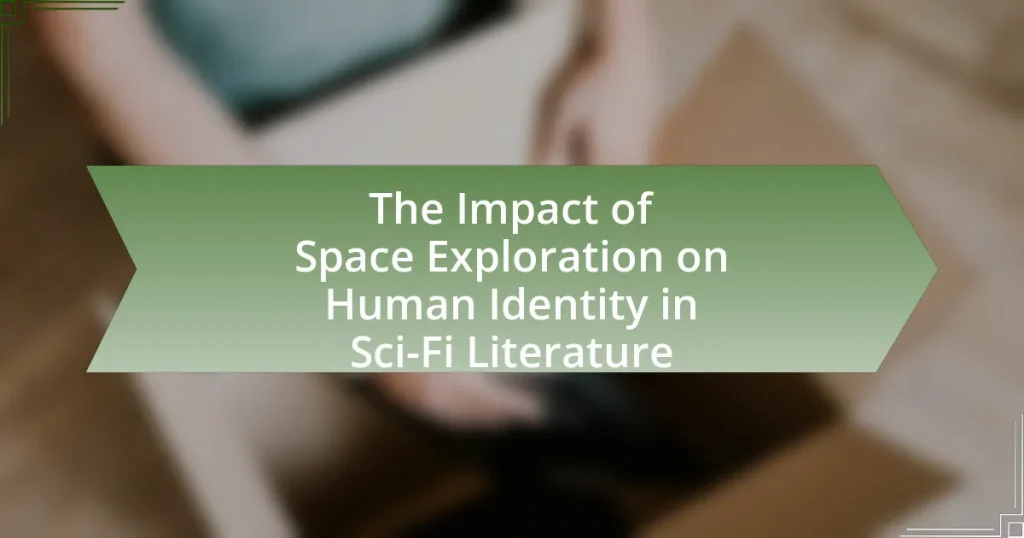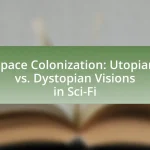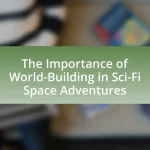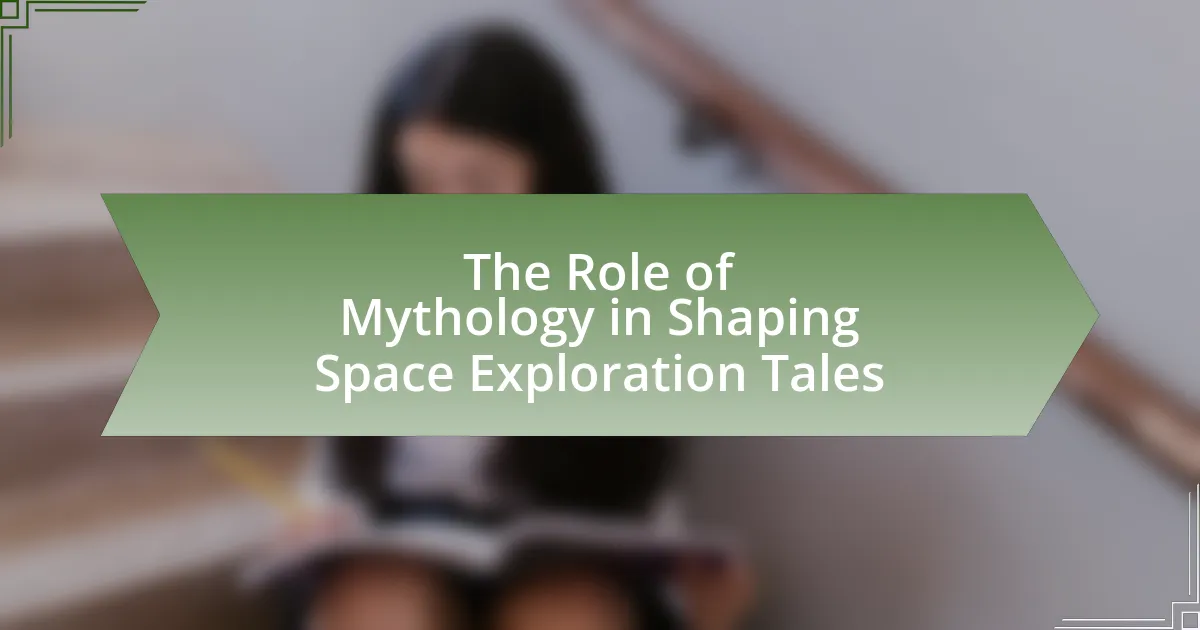The article examines the impact of space exploration on human identity as portrayed in sci-fi literature. It highlights how narratives in this genre challenge and expand the understanding of what it means to be human, particularly through themes of alien encounters, advanced technologies, and the vastness of the universe. Key works, such as Arthur C. Clarke’s “2001: A Space Odyssey” and Kim Stanley Robinson’s “Mars Trilogy,” are analyzed for their exploration of identity evolution, cultural implications, and existential questions arising from interactions with the unknown. The article also discusses the psychological effects of encountering alien species and the role of technology in shaping perceptions of self, ultimately emphasizing the fluidity of identity in the context of space exploration.
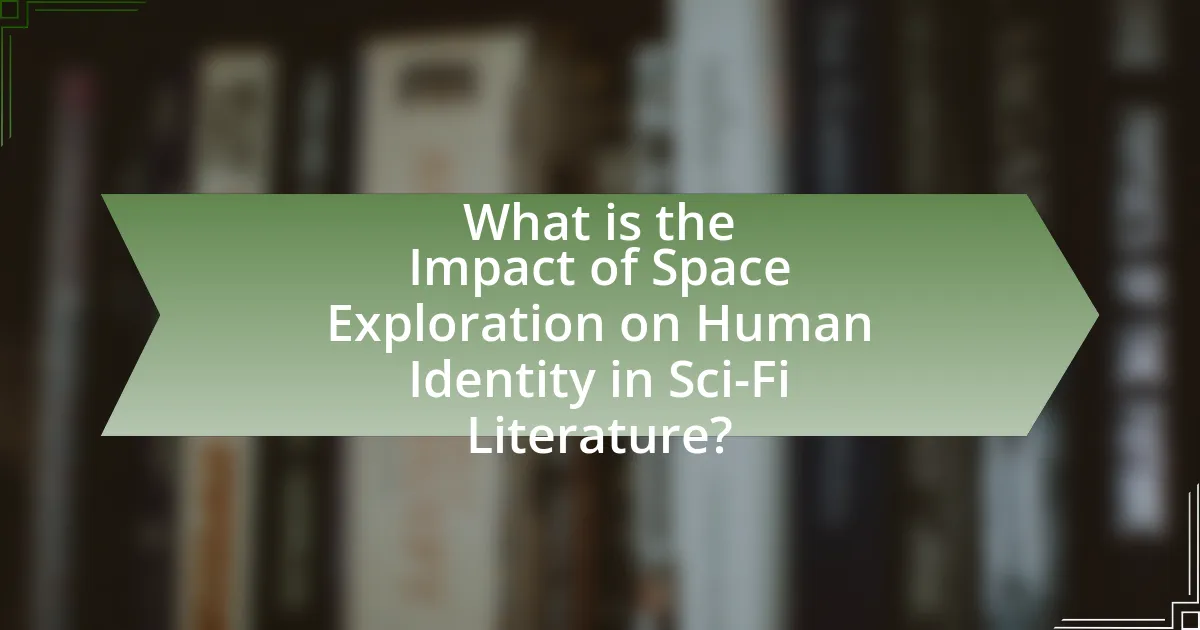
What is the Impact of Space Exploration on Human Identity in Sci-Fi Literature?
Space exploration significantly impacts human identity in sci-fi literature by challenging and expanding the understanding of what it means to be human. This genre often explores themes of alien encounters, advanced technologies, and the vastness of the universe, prompting characters and readers alike to reconsider humanity’s place in the cosmos. For instance, works like Arthur C. Clarke’s “2001: A Space Odyssey” illustrate the evolution of human consciousness in relation to artificial intelligence and extraterrestrial life, suggesting that identity is not fixed but rather fluid and influenced by external factors. Additionally, novels such as Kim Stanley Robinson’s “Mars Trilogy” delve into the implications of colonizing other planets, raising questions about cultural identity, ethics, and the essence of humanity in new environments. These narratives reflect a broader existential inquiry, emphasizing that space exploration serves as a catalyst for redefining human identity in the face of the unknown.
How does space exploration shape the concept of identity in sci-fi narratives?
Space exploration shapes the concept of identity in sci-fi narratives by challenging characters to confront their humanity in the face of the unknown. This confrontation often leads to a reevaluation of personal and collective identities, as characters navigate alien environments and cultures, which reflect their own societal values and beliefs. For instance, in Arthur C. Clarke’s “2001: A Space Odyssey,” the journey into space serves as a catalyst for human evolution, prompting characters to question their place in the universe and the essence of what it means to be human. Such narratives illustrate how the vastness of space acts as a mirror, revealing both the strengths and vulnerabilities of human identity, ultimately emphasizing the interconnectedness of all beings in the cosmos.
What themes related to identity are commonly explored in these narratives?
Common themes related to identity explored in narratives about the impact of space exploration on human identity include the search for self, the concept of belonging, and the evolution of humanity. These narratives often depict characters grappling with their identities in the context of vast, unfamiliar environments, prompting reflections on what it means to be human. For instance, works like Arthur C. Clarke’s “2001: A Space Odyssey” illustrate the transformation of human identity through interaction with advanced technology and extraterrestrial life, highlighting the tension between human nature and the unknown. Additionally, themes of isolation and connection are prevalent, as characters navigate their place in the universe, often leading to profound existential questions about purpose and community.
How do characters in sci-fi literature reflect changes in human identity due to space exploration?
Characters in sci-fi literature reflect changes in human identity due to space exploration by embodying the psychological and sociocultural transformations that arise from encountering the unknown. For instance, in Arthur C. Clarke’s “2001: A Space Odyssey,” the character of Dave Bowman undergoes a profound metamorphosis as he transcends human limitations, symbolizing humanity’s evolution in response to advanced technology and extraterrestrial encounters. This narrative illustrates how space exploration challenges traditional notions of identity, prompting characters to confront existential questions about consciousness and humanity’s place in the universe. Additionally, in works like Kim Stanley Robinson’s “Mars Trilogy,” characters grapple with the implications of colonizing new worlds, reflecting the complexities of identity formation in the context of environmental and societal changes. These examples demonstrate that sci-fi literature serves as a mirror for the evolving human identity shaped by the challenges and possibilities of space exploration.
Why is human identity a central theme in sci-fi literature related to space exploration?
Human identity is a central theme in sci-fi literature related to space exploration because it explores the fundamental questions of what it means to be human in the face of the unknown. As characters encounter alien civilizations, advanced technologies, and the vastness of space, they often confront existential dilemmas that challenge their understanding of self, morality, and humanity’s place in the universe. For instance, works like Arthur C. Clarke’s “2001: A Space Odyssey” delve into the evolution of human consciousness and identity through interactions with artificial intelligence and extraterrestrial life. This thematic focus reflects societal anxieties and aspirations regarding identity in an increasingly interconnected and technologically advanced world.
What philosophical questions about identity arise from space exploration in these stories?
Philosophical questions about identity that arise from space exploration in these stories include inquiries into what it means to be human when faced with alien life forms and the implications of advanced technology on self-perception. These narratives often challenge the notion of individuality by exploring themes such as the merging of human consciousness with artificial intelligence or the potential for genetic modification in extraterrestrial environments. For instance, stories like Arthur C. Clarke’s “2001: A Space Odyssey” raise questions about the evolution of humanity in relation to artificial beings, prompting readers to consider whether identity is defined by biological origins or cognitive capabilities. Such explorations highlight the fluidity of identity in the context of vast, unknown universes, suggesting that space exploration may fundamentally alter our understanding of what it means to be human.
How do different cultures and societies in sci-fi literature interpret identity in the context of space exploration?
Different cultures and societies in sci-fi literature interpret identity in the context of space exploration as a reflection of their unique values, beliefs, and existential questions. For instance, in works like Arthur C. Clarke’s “Rendezvous with Rama,” Western perspectives often emphasize individualism and technological advancement, portraying identity as something that evolves with scientific progress. Conversely, in Octavia Butler’s “Patternmaster,” African American cultural narratives highlight community and interconnectedness, suggesting that identity is shaped by social relationships and collective experiences in the face of cosmic challenges. These interpretations underscore how space exploration serves as a backdrop for exploring deeper questions of selfhood, belonging, and the human condition, illustrating the diverse ways societies grapple with identity amidst the vastness of the universe.
What role does technology play in shaping human identity in space exploration narratives?
Technology plays a crucial role in shaping human identity in space exploration narratives by serving as both a tool for survival and a catalyst for transformation. In these narratives, advanced technologies such as artificial intelligence, robotics, and life-support systems redefine what it means to be human, often blurring the lines between human and machine. For instance, in Arthur C. Clarke’s “2001: A Space Odyssey,” the HAL 9000 computer challenges the notion of human superiority and consciousness, prompting characters and readers alike to reconsider their understanding of identity. Additionally, the use of technology in space exploration often reflects societal values and aspirations, as seen in works like Kim Stanley Robinson’s “Mars Trilogy,” where terraforming technologies symbolize humanity’s desire to adapt and thrive in new environments. These examples illustrate how technology not only facilitates exploration but also profoundly influences the evolution of human identity within these narratives.
How do advancements in technology influence characters’ perceptions of self?
Advancements in technology significantly influence characters’ perceptions of self by altering their understanding of identity, agency, and existence. In sci-fi literature, characters often grapple with the implications of advanced technologies, such as artificial intelligence and space travel, which challenge traditional notions of what it means to be human. For instance, in Arthur C. Clarke’s “2001: A Space Odyssey,” the evolution of HAL 9000 raises questions about consciousness and self-awareness, prompting characters to reassess their own identities in relation to machines. This interplay between technology and self-perception illustrates how advancements can lead to existential crises or transformations, as characters navigate the complexities of their new realities.
What are the implications of artificial intelligence on human identity in these stories?
Artificial intelligence in these stories often challenges and reshapes human identity by blurring the lines between human and machine. This transformation raises questions about consciousness, autonomy, and the essence of what it means to be human. For instance, characters may grapple with their own humanity when confronted with AI that exhibits emotions or decision-making capabilities similar to humans, leading to existential dilemmas. Such narratives frequently explore themes of identity crisis, as individuals must redefine themselves in relation to increasingly sophisticated AI, highlighting the fluidity of identity in a technologically advanced society.
How does the portrayal of alien life affect human identity in sci-fi literature?
The portrayal of alien life in sci-fi literature profoundly influences human identity by challenging perceptions of humanity and prompting introspection about what it means to be human. This genre often presents alien civilizations with diverse cultures, technologies, and moral frameworks, which serve as mirrors reflecting human strengths and weaknesses. For instance, in Arthur C. Clarke’s “Childhood’s End,” the arrival of the Overlords leads humanity to evolve beyond its current state, forcing characters and readers alike to reconsider the essence of human identity in the face of superior beings. Such narratives encourage exploration of themes like empathy, coexistence, and the potential for human evolution, ultimately reshaping how individuals view themselves in relation to the universe.
What are the psychological impacts of encountering alien species on human characters?
Encountering alien species significantly impacts human characters psychologically, often leading to existential crises, shifts in identity, and altered perceptions of humanity. These encounters can evoke fear and anxiety due to the unknown, as seen in works like H.G. Wells’ “The War of the Worlds,” where humans grapple with their place in the universe when faced with a superior alien force. Additionally, such interactions can foster a sense of unity or division among humans, as depicted in Arthur C. Clarke’s “Childhood’s End,” where the arrival of aliens prompts both collaboration and conflict among human factions. The psychological effects are further evidenced by studies indicating that exposure to the concept of extraterrestrial life can challenge deeply held beliefs and provoke reevaluation of human values and societal norms.
How do interactions with aliens challenge or reinforce human identity?
Interactions with aliens challenge and reinforce human identity by prompting individuals to reevaluate their understanding of humanity in relation to other intelligent beings. For instance, in Arthur C. Clarke’s “Childhood’s End,” the arrival of extraterrestrial beings leads humanity to confront its limitations and potential, ultimately redefining what it means to be human. This narrative illustrates how encounters with aliens can catalyze profound shifts in self-perception and societal values, as humans grapple with their place in a broader cosmic context. Such interactions often highlight shared experiences and emotions, reinforcing a collective human identity while simultaneously challenging the uniqueness of human existence.
What are the key transitions from broader themes to specific insights in this topic?
Key transitions from broader themes to specific insights in “The Impact of Space Exploration on Human Identity in Sci-Fi Literature” include the exploration of existential questions, the evolution of human relationships, and the redefinition of identity in the context of advanced technology. For instance, existential themes often lead to specific insights about humanity’s place in the universe, as seen in works like Arthur C. Clarke’s “2001: A Space Odyssey,” which examines human evolution alongside artificial intelligence. Additionally, the theme of isolation in space can transition to insights about interpersonal connections, as depicted in novels like “The Martian” by Andy Weir, where human ingenuity and collaboration are highlighted. Lastly, the broader theme of technological advancement often transitions to specific insights regarding the ethical implications of space colonization, as explored in Kim Stanley Robinson’s “Mars Trilogy,” which addresses the complexities of identity in a multi-planetary society.
How can understanding these themes enhance our appreciation of sci-fi literature?
Understanding the themes of space exploration and human identity enhances our appreciation of sci-fi literature by providing deeper insights into the human condition and societal implications. These themes often reflect existential questions and moral dilemmas faced by humanity, allowing readers to engage with complex narratives that challenge their perceptions of identity and existence. For instance, works like Arthur C. Clarke’s “2001: A Space Odyssey” explore the evolution of humanity in relation to technology and the cosmos, prompting readers to reflect on their own place in the universe. This thematic exploration fosters a richer reading experience, as it connects personal and collective human experiences to broader philosophical inquiries.
What practical insights can we gain from analyzing the impact of space exploration on human identity in sci-fi literature?
Analyzing the impact of space exploration on human identity in sci-fi literature reveals insights into the evolving nature of self-perception and societal values. Sci-fi narratives often depict characters grappling with existential questions and moral dilemmas that arise from encounters with the unknown, reflecting humanity’s quest for meaning beyond Earth. For instance, Arthur C. Clarke’s “2001: A Space Odyssey” explores themes of evolution and consciousness, suggesting that space exploration can lead to a redefinition of what it means to be human. This literary analysis highlights how such stories can influence real-world perspectives on identity, prompting discussions about technology, ethics, and our place in the universe.
How can readers apply these insights to their understanding of contemporary issues in identity?
Readers can apply insights from the impact of space exploration in sci-fi literature to contemporary issues in identity by recognizing how narratives shape perceptions of self and society. For instance, characters in these stories often grapple with questions of belonging and humanity when faced with alien environments or advanced technologies, reflecting real-world dilemmas about identity in a globalized and technologically driven society. This mirrors current discussions on how globalization and digital identities challenge traditional notions of self, as seen in studies like “The Globalization of Identity” by Arjun Appadurai, which highlights the fluidity of identity in modern contexts. By analyzing these literary themes, readers can better understand the complexities of their own identities in relation to societal changes.
What lessons can be drawn from sci-fi literature regarding the future of human identity in an increasingly technological world?
Sci-fi literature illustrates that human identity will increasingly intertwine with technology, emphasizing adaptability and the redefinition of self. Works like “Neuromancer” by William Gibson explore the merging of human consciousness with artificial intelligence, suggesting that identity may become fluid as technology evolves. Additionally, “The Matrix” presents a scenario where reality is questioned, highlighting the potential for technology to alter perceptions of self and existence. These narratives underscore the importance of resilience and ethical considerations as humanity navigates its relationship with technology, indicating that future identities may be shaped by both technological advancements and the philosophical implications of those changes.
